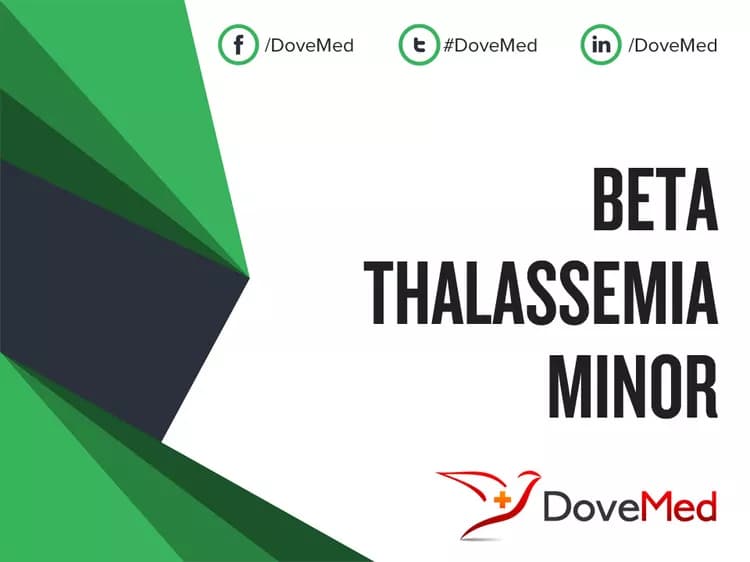What are the other Names for this Condition? (Also known as/Synonyms)
- Alpha Thalassemia Minor
- Anemia Hemolytic Thalassemia Minor
- Delta-Beta Thalassemia Minor
What is Beta Thalassemia Minor? (Definition/Background Information)
- Beta Thalassemia Minor (or Thalassemia Minor), a rare genetic blood disorder, is a defect in the synthesis of beta chains of hemoglobin (a protein that carries oxygen to the tissues). Unlike Thalassemia Major, Thalassemia Minor has only one defective beta globin gene
- A normal hemoglobin molecule is made up of two identical beta and two identical alpha chains. The defective beta chains are compensated by delta chains resulting in formation of hemoglobin A2. Since there is a defect in only one gene of beta globin chain, the normal hemoglobin A production is only minimally reduced. Thus, patients with Thalassemia Minor do not exhibit serious disease condition
- If both parents of a child are carriers of Thalassemia Minor, then there is a 25% chance that the child develops Thalassemia Major. If only any one parent is affected by Thalassemia Minor, then the disorder will be passed on to the child
- Most patients affected by Thalassemia Minor have mild anemia, which may be confused for iron deficiency anemia and treated inappropriately for iron deficiency
- Individuals with Thalassemia Minor do not have any serious medical problems; most of them may not be even aware that they have the disease
Who gets Beta Thalassemia Minor? (Age and Sex Distribution)
- In many individuals who are carriers of Beta Thalassemia Minor blood disorder, it remains unidentified as no symptoms are exhibited
- Both the sexes are equally prone to Thalassemia Minor; there is no sexual predilection
- This disorder is more prevalent among populations of the African, Mediterranean, and South East Asian countries
What are the Risk Factors for Beta Thalassemia Minor? (Predisposing Factors)
A few risk factors for Beta Thalassemia Minor are:
- African, Mediterranean, and South East Asian population
- Family history of Thalassemia
It is important to note that having a risk factor does not mean that one will get the condition. A risk factor increases ones chances of getting a condition compared to an individual without the risk factors. Some risk factors are more important than others.
Also, not having a risk factor does not mean that an individual will not get the condition. It is always important to discuss the effect of risk factors with your healthcare provider.
What are the Causes of Beta Thalassemia Minor? (Etiology)
Beta Thalassemia Minor is caused by the mutation in one of the genes of beta globin chains; unlike Thalassemia Major, where both the genes of the beta globin chain are affected.
What are the Signs and Symptoms of Beta Thalassemia Minor?
The signs and symptoms of Beta Thalassemia Minor include:
- Yellowish-tinged eyes
- Mild abdominal pain
- Anemia (mild)
- Low blood hemoglobin count
- Under a microscope, the red blood cells appear very small
- Symptoms are very few or may be even absent
How is Beta Thalassemia Minor Diagnosed?
The following diagnostic studies are used to determine the presence of Beta Thalassemia Minor:
- Hemoglobin electrophoresis showing slight increase in HbA2 and mild reduction in normal adult hemoglobin, HbA
- Iron studies showing high serum iron and low transferring iron binding capacity
- DNA analysis can be done to establish a diagnosis in patients with anemia, highly suspicious of Thalassemia Minor
- The above shall be correlated with physical examination and thorough family medical history evaluation
Many clinical conditions may have similar signs and symptoms. Your healthcare provider may perform additional tests to rule out other clinical conditions to arrive at a definitive diagnosis.
What are the possible Complications of Beta Thalassemia Minor?
There are no known complications associated with Beta Thalassemia Minor.
How is Beta Thalassemia Minor Treated?
There is no treatment generally required for Beta Thalassemia Minor.
How can Beta Thalassemia Minor be Prevented?
- Currently, there are no specific methods or guidelines to prevent Beta Thalassemia Minor genetic condition
- Genetic testing of the expecting parents (and related family members) and prenatal diagnosis (molecular testing of the fetus during pregnancy) may help in understanding the risks better during pregnancy
- If there is a family history of the condition, then genetic counseling will help assess risks, before planning for a child
- Active research is currently being performed to explore the possibilities for treatment and prevention of inherited and acquired genetic disorders
Beta Thalassemia Minor is a rare genetic disorder and it cannot be prevented. However, the incidence in children can be decreased through genetic and premarital counseling:
- Mass screening of high-risk populations for Thalassemia Minor
- Population education
What is the Prognosis of Beta Thalassemia Minor? (Outcomes/Resolutions)
The prognosis of Beta Thalassemia Minor is good; individuals with the condition are able to lead a normal life.
Additional and Relevant Useful Information for Beta Thalassemia Minor:
Beta Thalassemia Major is a genetic disease affecting the production of components of hemoglobin.
Related Articles
Test Your Knowledge
Asked by users
Related Centers
Related Specialties
Related Physicians
Related Procedures
Related Resources
Join DoveHubs
and connect with fellow professionals


0 Comments
Please log in to post a comment.